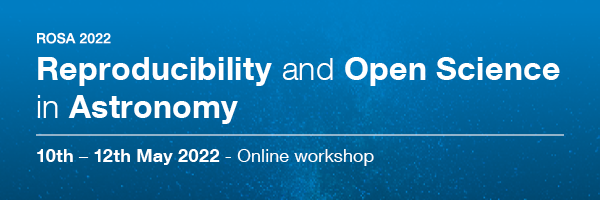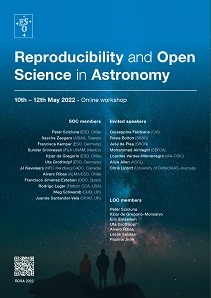ROSA2022

May 10-12, 2022
From 9:00 to 14:00 CLT
Registration is free to all participants.
Rationale:
The way we do science is constantly evolving and is currently undergoing a paradigm shift thanks to several factors. It is partly driven by the general tendency towards openness in society, and the idea that the outcomes of publicly-funded science should be freely available.
The same obstacles faced by openness -- the publish-or-perish climate and the ever-increasing volume and complexity of astronomical data and simulations -- also create an urgent need for it. New technologies also provide opportunities such as cloud computing and collaborative platforms, while improving education enables us to respond to these topics with new approaches. Furthermore, as existing and upcoming facilities (e.g. ALMA, SKAO, SDSS-V, Vera Rubin Observatory, ELTs) promise revolutionary scientific capabilities, it only makes sense to revolutionise our approaches to science at the same time. Collectively, these are driving a shift towards open science, where tools and data are shared freely, ideally in accessible and inter-operable formats. Incorporating open and reproducible workflows at the outset of research could help promote efficient retrofitting and new developments. It may also be a transparency leveraging tool to ease comparison and maximise robustness, including for raw/reduced data products, simulations, modelling and theoretical works, while reasonable safeguards can be implemented. Making it easier to identify the process yielding scientific results may become a standard for the astronomical community, and if properly implemented and distributed, accelerates scientific progress. In turn, a shift in emphasis of the community may be reflected in hiring practices, requiring the use of alternative metrics to evaluate candidates and career progression.
The primary goal of the workshop is to discuss the relevance of reproducible workflows in astronomy and potential pathways for the astronomical community. As part of the workshop, we will aim to share examples of reproducible work as well as tools and techniques for improving reproducibility and for mining astronomical data. We will discuss community guides, tools and white papers related to data sharing, reproducible workflows, data mining and big-data problems.
Format:
The conference is scheduled to take place online (as a Zoom meeting), for 5 hours each day of the program.
The times for the live programme will be tailored to the geographical distribution of the attendees, with significant parts in time zones scheduled to suit attendees in South America. The deadline for submission of abstracts is on April 1 and for the general registration May 1.
This meeting will mix invited and contributed talks, posters, discussion and unconference sessions to generate ideas around reproducible and open science in astronomy. Our objective is to facilitate discussions and development of best practices and new ideas which may lead to, for example, white papers. The conference will have a dedicated Slack to foster discussions.
ESO Code of Conduct:
We aim to host a friendly and productive meeting which is welcoming for everyone. As such, we ask all participants to adhere to the ESO Conference Code of Conduct. In summary:
- Behave professionally. Harassment and sexist, racist, or exclusionary comments or jokes are not appropriate. Harassment includes sustained disruption of talks or other events, inappropriate physical contact, sexual attention or innuendo, deliberate intimidation, stalking, and photography or recording of an individual without consent. It also includes offensive comments related to individual characteristics, for example: age, gender, sexual orientation, disability, physical appearance, race, nationality or religion.
- All communication should be appropriate for a professional audience including people of many different backgrounds. Sexual or sexist language and imagery is not appropriate.
- Be respectful and do not insult or put down other attendees or facilitators of the event. Critique ideas not people.
- Should a participant witness events of bullying, harassment or aggression, we recommend that they approach the affected person to show support and check how they are. The witness may also wish to suggest that the person report the inappropriate behaviour. However, it is up to the affected person alone whether or not they wish to report it.
- If participants wish to share photos of a speaker on social media, we strongly recommend that they first get the speaker’s permission. Participants may also share the contents of talks/slides via social media unless speakers have asked that specific details/slides not be shared.
Quick links
Keywords: Reproducibilty | open data | altmetrics | open-source software | collaboration tools | data mining | best practices
Workshop email: ROSA2022@eso.org

